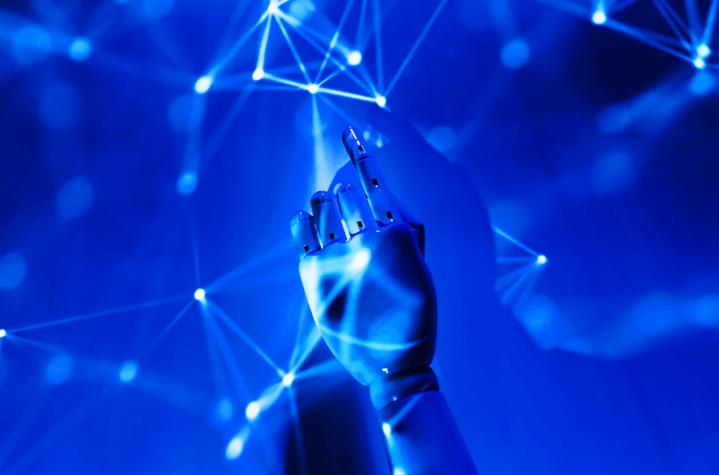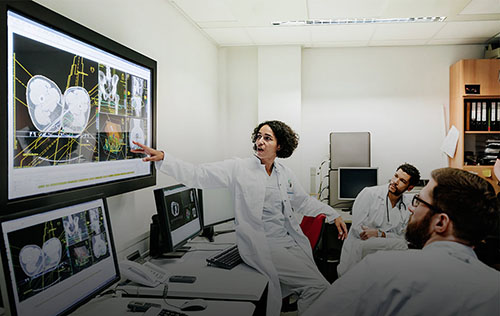AI is just math, sexy math, but math
An AI expert breaks down the technology and how it’s used in healthcare
Chances are you’ve encountered artificial intelligence during a trip to the doctor’s office and now have some questions.
So we reached out to one of our AI experts at Medtronic to explain the different types of AI used in healthcare today and what that might look like in the future.

Rodolphe Katra was recently named the company’s first-ever vice president of artificial intelligence. He played a pivotal role in developing the algorithm that helps one of our heart monitors more accurately detect certain irregular heartbeats. That technology recently earned MedTech’s Breakthrough Award for Best Monitoring Solution and the 2023 Tekne Award for advancements in artificial intelligence.
So, what’s the most important thing to know about AI?
“AI is just math. It’s sexy math, but it’s basically just math,” Katra said. “I think that often gets lost in conversations about AI.”
AI vs. machine learning vs. deep learning vs. generative AI
Artificial intelligence is nothing new. The first successful AI program was written by a University of Oxford professor in 1951.
At its core, AI is the simulation of human intelligence by machines, usually computer systems. Newer to the scene is machine learning. That’s when computers “learn” from human-provided data without explicit programming and can make decisions or predictions. This is what drives chatbots, language translation apps, and social media feeds.
Katra compared machine learning to teaching a language to a toddler.
“If I tell you this is a cup, and then I show you a series of images of a cup, your understanding of a cup is limited to what I’ve shown you,” Katra said. “If I show you a Viking horn that was used as a cup hundreds of years ago, you probably won’t recognize it as a cup because I didn’t teach you that.”
The analogy is similar when applied to machine learning in medical applications. Show an algorithm a few thousand examples of a polyp or an arrhythmia, it will learn to identify new polyps and arrhythmias that share general patterns with what is has “learned” previously.
Deep learning is a form of machine learning, but uses complex neural networks, which are a series of algorithms that identify patterns in data. Neural networks use interconnected nodes designed to function like neurons in the human brain.
“The human brain is wired to recognize patterns,” Katra said. “With deep learning, we are asking how the machine learns. It’s a much more difficult question to answer but I would argue that most humans don’t really understand how they learn. They just learn.”
How AI supports clinical decision making
Today the healthcare industry widely uses AI, mostly for two major functions – the automation of tasks and diagnostic decision making.
Patients often interact with AI in the form of a chatbot when they make an appointment to see their doctor. Likewise, healthcare providers might use AI to comb through patient records to determine who is overdue for a scheduled checkup.
When AI helps automate tasks for healthcare professionals, it frees them up to focus on patients. Healthcare leaders are hopeful that AI might help reduce clinician burnout, which has remained a troubling trend since the COVID-19 pandemic.
Artificial intelligence also helps doctors diagnose patients, often by analyzing data such as images of the body. For example, at Medtronic, our intelligent endoscopy module analyzes images taken during a colonoscopy.
With AI, it can detect small-flat polyps that often aren’t detectable by the human eye.
How AI will treat patients in the future
While AI is becoming widely used to diagnose diseases, in the future, it could be used to help treat diseases.
Katra predicts this evolution could still be a decade or so away given the technological complexities and the changing regulatory landscape.
Once companies can “unlock” algorithms in medical devices, we could witness a new era of “personalized” medicine, Katra said.
“Imagine if you had a pacemaker or insulin pump and we left 20 percent of the algorithm open, meaning that it had the ability to learn about some of your individual traits like your level of fitness or whether you adhere to your medication regime. That algorithm would be very different than the one generated for other people. Industry disruption will happen when personalized algorithms are available, but we’re not there yet.”
L00112042023
Related content



